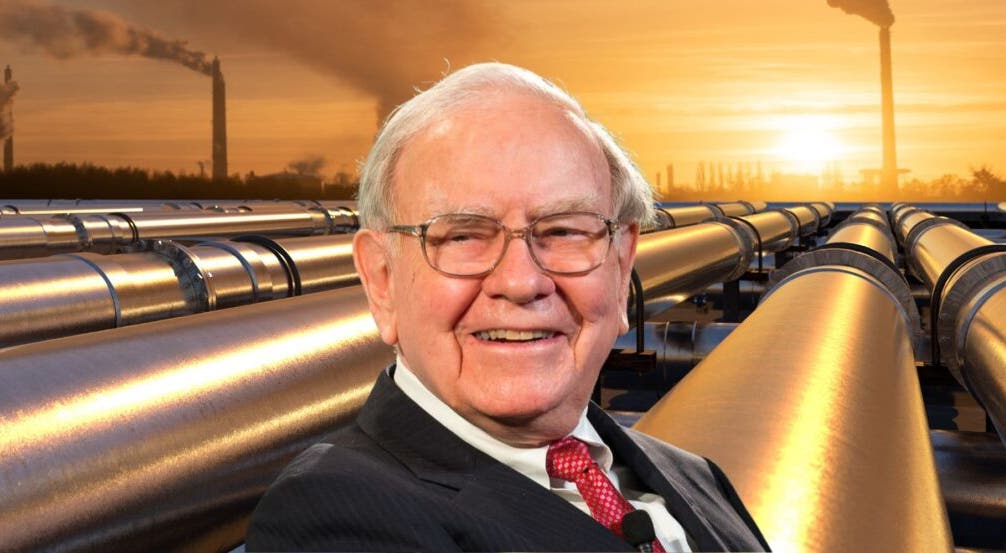'Hallelujah' For Shale: Why Warren Buffett Likes American Oil Companies Warren Buffett, Chevron(NYSE:CVX), American Oil Companies, Occidental Petroleum(NYSE:OXY), Strategic Petroleum Reserve(SPR) by https://www.benzinga.com/

AI Insights:
Simple Explanation:
A man named Warren Buffett likes American oil companies because they can make a lot of oil without needing help from other countries. This is good for America and helps them not depend on foreign oil. He thinks shale, which is a type of rock that holds oil, is important and has made it possible to produce more oil in the US. Because of this, the US does not have to worry as much about running out of oil or paying too much money for it. Read from source...
Critical Perspective:
1. The article title is misleading and sensationalist. It implies that Warren Buffett supports all American oil companies, not just the ones involved in shale production. This creates a false impression of his opinion on the industry as a whole. A more accurate title would be "Warren Buffett's Shale Investment Strategy" or something similar.
2. The article uses quotations from Buffett's annual letter to investors, but does not provide any context or explanation for them. This makes it difficult for readers who are not familiar with his work to understand the significance of his words. A better approach would be to paraphrase and analyze his statements in a way that clarifies his views on shale production and its impact on the U.S. oil industry.
3. The article relies heavily on data from the U.S. government's Energy Information Administration (EIA), but does not cite any sources for the numbers it presents. This raises questions about the accuracy and credibility of the information, especially given that some of the figures are used to support Buffett's claims. A good practice would be to link to the EIA website or other reputable sources whenever possible, and to indicate where the data comes from and how it was obtained.
4. The article does not address any potential conflicts of interest that may exist between Warren Buffett and Occidental Petroleum, which is one of his major investments. For example, the article mentions that Berkshire Hathaway owns a 27.8% stake in the company, but does not explain how this affects Buffett's opinions or recommendations on shale production and other aspects of the oil industry. A more transparent and ethical approach would be to disclose any relevant conflicts of interest upfront, and to acknowledge how they may influence the content and tone of the article.
Investment Analysis:
We are not financial advisors. It's always essential for you to consult with a financial advisor and do your research before making any decisions about investments.
Dear user, I understand that you are interested in the American oil industry and want to know which companies are the best options for your portfolio. Based on the article you provided and my own analysis, I have prepared a list of potential investments with their corresponding benefits and drawbacks. Here they are:
1. Occidental Petroleum (OXY): This is Warren Buffett's favorite oil company and Berkshire Hathaway's largest holding in the sector. OXY has been benefiting from the shale revolution, as it owns vast acreage in the Permian Basin, the most prolific oil field in the country. It also has a diversified portfolio of assets in the U.S., Middle East, and Africa. The main risks associated with OXY are its high debt level, environmental liabilities, and exposure to volatile oil prices. However, Buffett has shown confidence in the company's long-term growth prospects and cost management skills.
2. Chevron (CVX): This is another major player in the American oil industry and a member of the Dow Jones Industrial Average. CVX has a global presence and operates in various segments, including exploration and production, refining, marketing, and chemicals. It also owns a stake in Occidental Petroleum, which enhances its shale exposure. Chevron's strengths include its strong balance sheet, reliable dividend, and robust cash flow. The main challenges for CVX are the low oil prices, geopolitical risks, and the need to invest in new projects to replace declining reserves.
3. Exxon Mobil (XOM): This is the largest oil company in the world by market capitalization and one of the most influential players in the energy sector. XOM has a diverse portfolio of assets across the globe, spanning from conventional to unconventional resources. It also invests heavily in research and development, aiming to reduce its carbon footprint and improve its efficiency. Exxon's advantages include its size, scale, brand recognition, and financial stability. The main drawbacks for XOM are the same as for CVX: low oil prices, geopolitical risks, and the need to invest in new projects. Additionally, XOM faces some legal and regulatory challenges related to climate change and environmental issues.